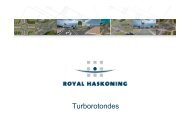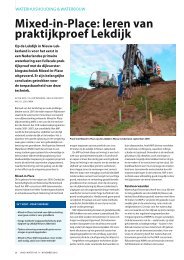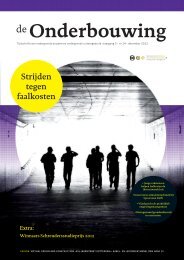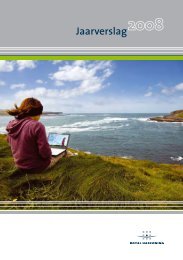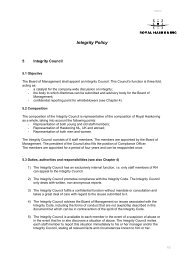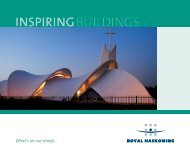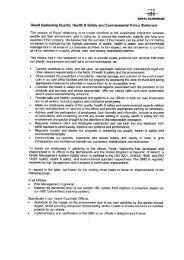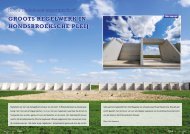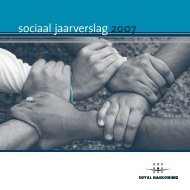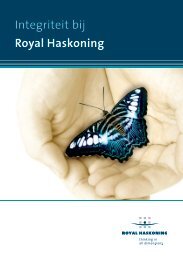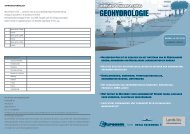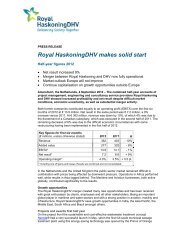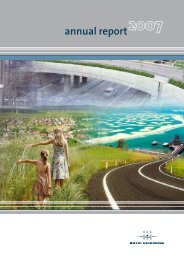rsi foundation - Royal Haskoning
rsi foundation - Royal Haskoning
rsi foundation - Royal Haskoning
You also want an ePaper? Increase the reach of your titles
YUMPU automatically turns print PDFs into web optimized ePapers that Google loves.
the<br />
<strong>rsi</strong> <strong>foundation</strong><br />
A New Approach to Innovation and Quality in the Building Industry<br />
about us...<br />
Stichting Rotterdam Sustainability Initiative (RSI) is a non-profit<br />
<strong>foundation</strong> established to stimulate sustainability primarily<br />
through education and research in the field of Cradle to Cradle®*,<br />
exergy and CO 2<br />
management. Its mandate and membership reach<br />
far beyond the city of Rotterdam and has potentially European<br />
eradiation.
mission, goals and strategies<br />
The mission of the RSI Foundation is to promote sustainability primarily through education and<br />
research in the fields of Cradle to Cradle®, exergy and CO 2<br />
management.<br />
RSI has set a number of institutional goals: i) establishing a unive<strong>rsi</strong>ty chair in cooperation with<br />
unive<strong>rsi</strong>ties in The Netherlands, ii) contributing to Master of Science programmes at Erasmus and<br />
Delft Unive<strong>rsi</strong>ty of Technology in which Cradle to Cradle® plays a crucial role and iii) promoting exergy<br />
research at the Delft Unive<strong>rsi</strong>ty of Technology.<br />
Furthermore RSI wants to stimulate the formation of a knowledge base for Cradle to Cradle® criteria<br />
and methods in the built environment within the Netherlands with potentially a European eradiation.<br />
To achieve its mission RSI is using these strategies:<br />
Quality Assurance Strategy: Develop a set of quality assurance criteria that can be used by auditors and<br />
are narrowly designed to allow auditors to verify that Cradle to Cradle® certified activities are accurately<br />
implemented.<br />
Innovation Strategy: Keep Cradle to Cradle® innovation methods practical and dynamic yet consistent<br />
by working with governments, companies, architects, engineers and suppliers and other stakeholders.<br />
Independence Strategy: To prevent conflict of interest, RSI works through the academic community to<br />
develop, optimise and maintain Cradle to Cradle® criteria and methods.<br />
Stakeholders: The knowledge base is intended for use by 1) auditing organisations who are verifying<br />
claims about Cradle to Cradle® products and processes, 2) companies and governments working in the<br />
built environment who want reliable information on Cradle to Cradle®. The knowledge base is distinct<br />
from Cradle to Cradle® certification criteria. RSI does not certify products or services.<br />
operational structure<br />
RSI has no staff and instead its resources go into supporting defined Cradle to Cradle® work at other<br />
institutions. To achieve the mission and goals along the stated strategies, RSI focuses on these mechanisms:<br />
l 2008-09: Implementation of a Unive<strong>rsi</strong>ty Chair. Prof. Dr. Michael Braungart has been appointed by RSI to<br />
the position of Chair for Cradle to Cradle® in relation to sustainable system innovations and transitions<br />
in theory and in practice. The Chair is currently based at the Dutch Research Institute for Transitions<br />
(DRIFT) at Erasmus Unive<strong>rsi</strong>ty, and collaborates with the Technical Unive<strong>rsi</strong>ty at Delft as well as other<br />
academic institutions. Start of research activities as defined under Programme Goals.<br />
l 2008-09: RSI board representing top management of government and companies, which itself helps to<br />
accelerate innovation across sectors.<br />
l 2009-10: Scientific and Technical Working Group chaired by Cradle to Cradle® founders and comprised<br />
of advisory board experts from the building, landscaping, materials, energy, water, infrastructure, and<br />
chemicals sectors. This is the “work horse” of the RSI programme.<br />
l 2009-11: Technical round tables for companies and governments. A first round table is scheduled for the<br />
role of algae in high performance systems for wastewater, CO 2<br />
management, biofuels, and biopolymers.<br />
l 2009-11: Internships for students who actively participate in developing Cradle to Cradle® methods.<br />
Many internships have already been established and students have been placed in the floor coverings,<br />
recycling, furniture and other industries.<br />
l 2010-11: Web-based interactive knowledge base of Cradle to Cradle® methods and criteria.
unive<strong>rsi</strong>ty programme<br />
In order to pursue the mission and goals of the RSI <strong>foundation</strong>, the following programme goals of the<br />
unive<strong>rsi</strong>ty Chair have been established in accordance with the defined strategies.<br />
Programme Goals:<br />
l 2009 priority: Cradle to Cradle® quality assurance auditing criteria such as Key Performance<br />
Indicators that let auditors help companies make sure Cradle to Cradle® is applied as intended.<br />
Deliverable; Provide various European-based auditing firms with criteria that let them verify Cradle to<br />
Cradle® activities in organisations.<br />
l 2009-10 priority: Cradle to Cradle® principles for buildings, area development and infrastructure<br />
& transport. Emphasis on Total cost of ownership/LCC approaches. Deliverables; Describe how LCC<br />
enhances Cradle to Cradle® in new or renovated buildings. Apply Cradle to Cradle® to a road construction<br />
project.<br />
l 2009-11: Cradle to Cradle® procurement and purchasing criteria for products frequently used in the built<br />
environment, with an early focus on government procurement. Deliverable; evaluate Dutch government<br />
criteria for procuring products.<br />
l 2009-10: Cradle to Cradle® systems for biodive<strong>rsi</strong>ty, biomass and topsoil production in the built<br />
environment. Deliverable; Round Table on algae for CO 2<br />
capture, biomass production and topsoil<br />
preservation.<br />
l 2010: Cradle to Cradle® criteria for “defined use periods” so recycled raw materials have dependable<br />
availability for their users. Deliverable; Describe defined use periods for structure, exterior skin, and<br />
moveable contents.<br />
l 2010: Inventory of Cradle to Cradle® systems to make sites and structures positive generators of energy,<br />
clean air and water. Deliverables; Describe exergy as a way to improve effectiveness of energy generation<br />
and use. Describe Cradle to Cradle® systems integration for energy, clean air and water.<br />
l 2010-11: Supply chain management criteria for Cradle to Cradle® building products and movables.<br />
Deliverable; case study on supply chain management innovations in construction materials recycling.
enefits to joining<br />
RSI is the only organisation with a mix of government, corporate and academic players focussed on Cradle<br />
to Cradle® in the built environment.<br />
Due to its special mix RSI has the capacity to work closely with the industry and government on practical<br />
Cradle to Cradle® criteria. Due to those benefits, organisations that join RSI gain early access to these<br />
important developments:<br />
l Being on the cutting edge of Cradle to Cradle® criteria for the built environment.<br />
l Being part of a network that integrates criteria across industries, resulting in new partnerships.<br />
l Getting regular briefings on new technologies being considered for Cradle to Cradle® applications.<br />
And copies of articles being submitted for publication. Accessibility to Cradle to Cradle® founders who<br />
collaborate with RSI.<br />
l Early warning of new risks in the built environment.<br />
l Protecting your organisation’s interest in Cradle to Cradle® quality assurance, so the methodology will<br />
stay strong and not be diluted by imitations.<br />
l RSI has appointed to its academic Chair one of the founders of the Cradle to Cradle® methodology<br />
how to join<br />
RSI wants you! Only through a co-operation is it possible to accelerate eco-effective buildings and sites.<br />
All listed benefits to joining are obtained through a 10 K1/year flat membership fee.<br />
If you have specific R&D questions regarding Cradle to Cradle® or you want to influence the research<br />
programme, RSI can make a tailor-made package based on your needs, requirements and financial<br />
possibilities.<br />
RSI is looking for European organisations who want to be winners in the new paradigm by using Cradle<br />
to Cradle® innovation and quality.<br />
For more information: RSI invites top management representatives to contact RSI Chairman Jan Bout<br />
(j.bout@royalhaskoning.com)<br />
launching members:<br />
The Floor is Yours<br />
*Cradle to Cradle® is a registered mark of McDonough Braungart Design Chemistry.



